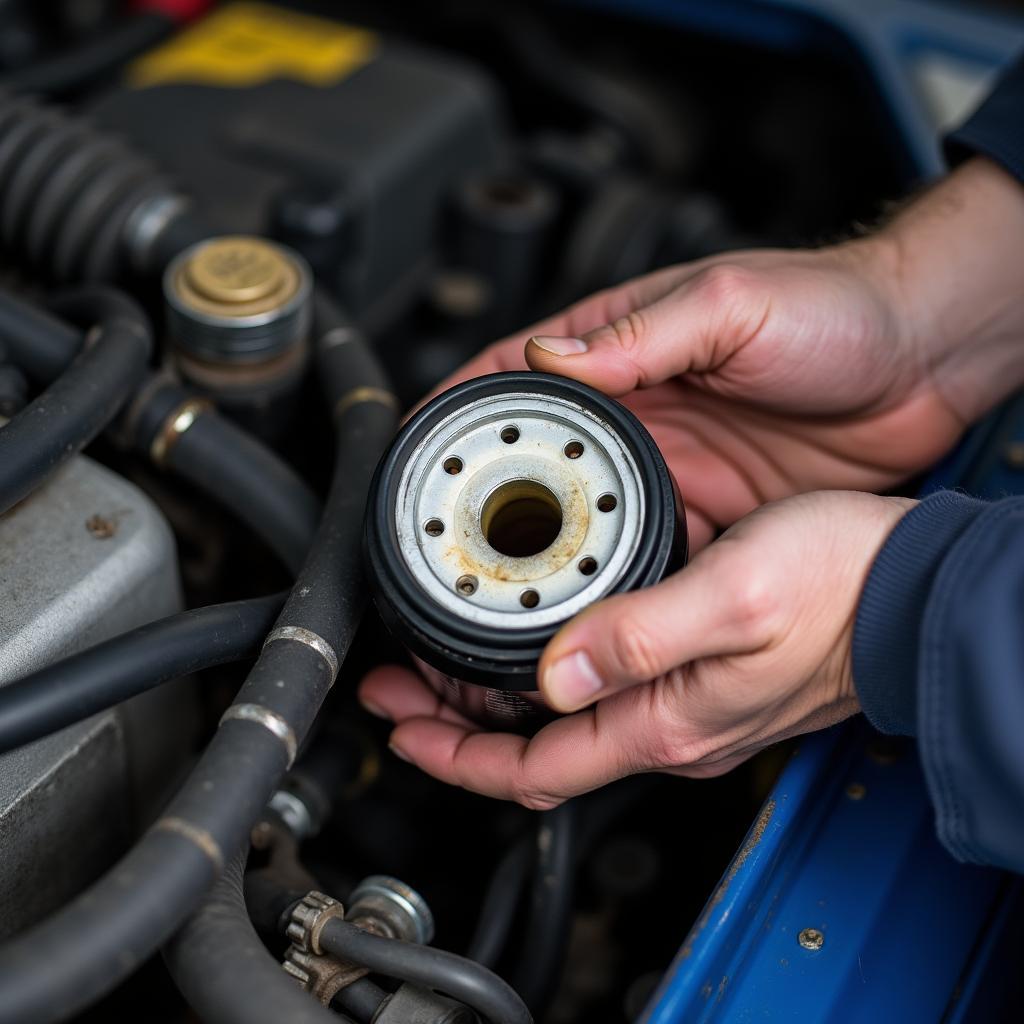Owning a diesel car comes with its own set of maintenance requirements. Unlike their gasoline counterparts, diesels have unique components and fluids that need regular attention. But what exactly does a full service on a diesel car entail? Let’s dive into the specifics and understand why it’s crucial for optimal performance and longevity.
A full service for your diesel engine goes beyond a simple oil change. It’s a comprehensive check-up designed to address the unique needs of your diesel engine. Think of it as a thorough health check-up for your vehicle.
Key Components of a Diesel Car Full Service
Here’s a breakdown of the essential procedures typically included in a full service:
1. Oil and Filter Change
Just like gasoline engines, diesel engines need regular oil changes to keep things running smoothly. This involves:
- Draining the old engine oil: This removes contaminants and debris that can build up over time.
- Replacing the oil filter: A new filter ensures that the fresh oil circulating through the engine stays clean.
- Refilling with the correct grade of diesel engine oil: Diesel engines require specific oil formulations designed for their unique operating conditions.
2. Fuel Filter Replacement
The fuel filter plays a vital role in a diesel engine by removing impurities from the fuel before it reaches the injectors. Over time, this filter can become clogged, potentially affecting engine performance.
3. Air Filter Inspection/Replacement
Clean air is crucial for efficient combustion. A clogged air filter restricts airflow to the engine, impacting fuel economy and potentially causing a loss of power.
4. Coolant System Check
The cooling system in a diesel engine works harder than in a gasoline engine due to higher operating temperatures. This check usually involves:
- Inspecting coolant levels and condition: Low coolant or contaminated coolant can lead to overheating.
- Checking for leaks in the system: A pressure test can help identify any potential leaks in hoses, the radiator, or other components.
5. Brake System Inspection
This critical safety check involves:
- Inspecting brake pads and discs for wear: Worn brake components affect stopping distances and overall safety.
- Checking brake fluid levels and condition: Brake fluid can absorb moisture over time, reducing its effectiveness.
6. Additional Checks
Along with the core components, a full service might also include:
- Checking and adjusting drive belts: Worn belts can affect the performance of the alternator, power steering, and air conditioning.
- Inspecting the exhaust system for leaks: Diesel exhaust leaks can be hazardous.
- Checking tire pressure and condition: Proper tire pressure ensures optimal fuel efficiency and handling.
Benefits of Regular Diesel Full Service
Sticking to a regular full-service schedule for your diesel car offers numerous benefits:
- Improved Engine Performance: Clean oil, filters, and a well-maintained fuel system contribute to optimal engine performance, potentially enhancing fuel efficiency and power output.
- Extended Engine Life: Regular maintenance helps prevent premature wear and tear on vital engine components, potentially saving you costly repairs down the line.
- Increased Safety: A thorough inspection of your brakes and other safety-critical systems provides peace of mind and helps ensure your vehicle is safe to drive.
- Reduced Risk of Breakdowns: Addressing minor issues before they escalate into major problems can prevent inconvenient and costly breakdowns.
How Often Should You Get a Full Service?
The recommended service intervals can vary depending on your vehicle’s make and model, driving conditions, and the type of diesel engine oil you use. Always consult your owner’s manual for specific recommendations. However, a good rule of thumb is to have a full service performed annually or every 10,000-15,000 miles, whichever comes first.
“Regular maintenance is the key to maximizing the life of your diesel engine,” says John Smith, a senior diesel mechanic with over 20 years of experience. “Don’t underestimate the importance of those scheduled service appointments.”
Conclusion
Understanding what constitutes a full service for your diesel car is essential for responsible ownership. By adhering to a regular maintenance schedule and addressing any issues promptly, you can ensure your diesel engine runs smoothly, efficiently, and safely for years to come. Remember, a well-maintained diesel engine is an investment that pays dividends in performance, reliability, and peace of mind.


